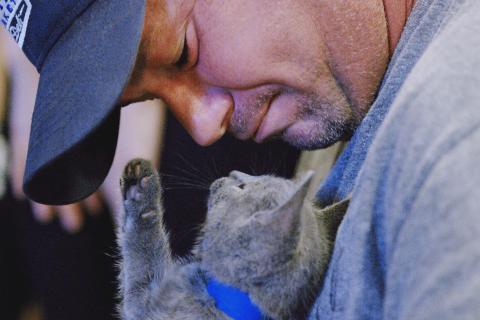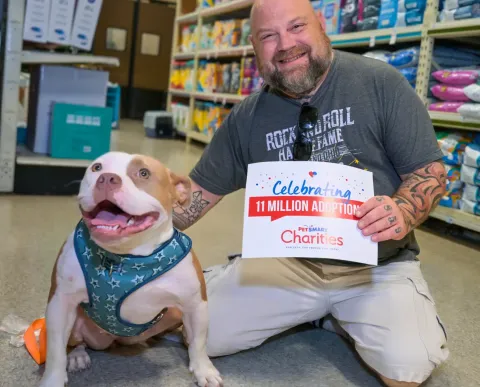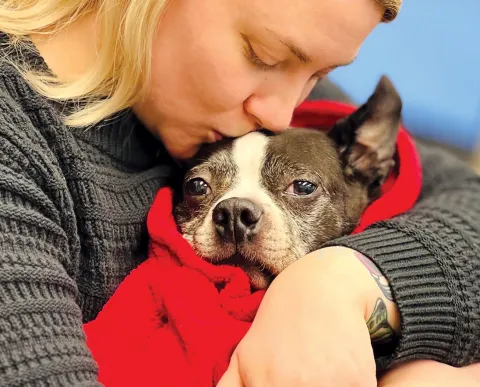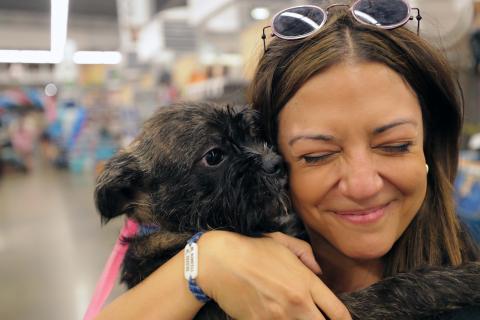
Robyn Jaynes
Director of Veterinary Affairs
Dr. Robyn Jaynes has seen the healing powers of unconditional love first-hand.
"As a military child, my family moved regularly, and the consistent companionship from our pets was essential in making a successful transition in a new place."
It was this early introduction to the incredible benefits of the human-animal bond that propelled Dr. Jaynes on a thriving animal-welfare trajectory.
Armed with a DVM from Texas A&M University and a Graduate Certificate in Shelter Medicine from the University of Florida, Dr. Robyn Jaynes joins PetSmart Charities as Director of Veterinary Affairs. While her formal education focused on medical and behavioral sciences, she has also completed extensive management and leadership training. She believes that without strong leadership, the effectiveness of one's knowledge is limited.
Dr. Jaynes’s volunteer work further demonstrates her dedication to quality pet care. For the last ten years, Dr. Jaynes has served on the investigative committee of the Arizona Veterinary Medical Examining Board, reviewing, and investigating complaints against licensed veterinarians. Further, the Governor appointed her to serve a four-year term on the Arizona State Veterinary Medical Examining Board. This Board is responsible for protecting the health, safety, and welfare of the public and their animals by enforcing veterinarians' standards. Dr. Jaynes also actively volunteers for animal welfare groups raising awareness for homeless pets in the community.
When she's not busy leading change for good, Dr. Robyn keeps busy managing the sports schedule for her two boys, Everett and Nolan, and tending to her three cats, Koa, Grey kitty, and Blackie.
Mission Moments
with Robyn
Why do you think pets are important in the lives of people?
There are so many reasons pets are important in our lives; it is hard to pick just one! The impact on mental health and well-being has resonated so many times throughout my life that this benefit rises to the top. As a military child, my family moved regularly, and the consistent companionship from our pets was essential in making a successful transition to a new place. My parents (and exceptional animal lovers) prioritized our pets every move we made, even if that included the family bunny making the long trip to Germany. We were fortunate to experience the love and affection of all kinds – from dogs and cats to rabbits and birds. It is not just for kids, though, that this bond is essential; in fact, my pets have been there through every stage of my life, and as I watch my parents now in retirement with their pets, the ongoing benefits are so obvious. I hope that we give our pets half of the benefits they provide us!
What makes you most excited about working at PetSmart Charities?
Addressing the challenges in animal welfare and accessible veterinary care will require an all-hands-on-deck approach, and I couldn't be more excited to jump in. While financial help and programs for homeless pets will always be necessary, I love that Charites has expanded the mission to include the pets and the people who love them. I am excited to partner with other organizations focused on similar missions to make the most significant impact possible.
What motivates you to want to be involved in the future of animal welfare?
I love animal welfare and the progress that has been made over the last 10-15 years. We have seen many positive changes, from improving shelter standards and making pet enrichment a standard practice to programs focused on reducing shelter intake. The results in animal homelessness and euthanasia are amazing. I am, however, even more excited to see animal welfare shift to helping animals in their homes and with their families rather than waiting till they are in the shelter. This is good for everyone – the shelter, the pets, and their families.
What's one stigma about pet parenting you wish would end?
While we hear so many heart-warming stories about people and their adopted pets, I still hear comments about how adopting from a shelter is risky because so many shelter pets have behavior problems. Pets can end up in shelters for so many reasons that assuming it is from a behavior problem is just plain silly. Many shelter pets come to the shelter with a history, or we gain information about the pet while in foster care, so actually, shelters often know more about them! And, even more importantly, we all have behavior opportunities (humans included!); it is more about finding the right match for you and spending time to learn together.






